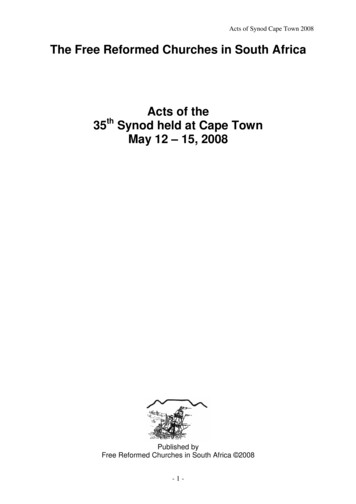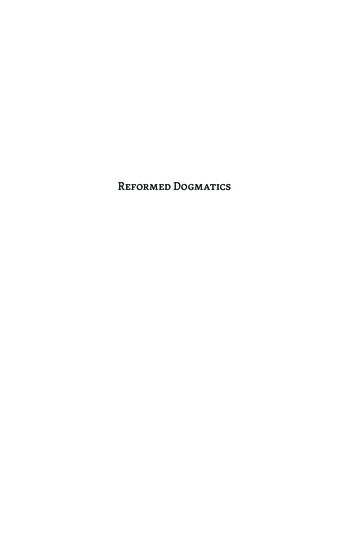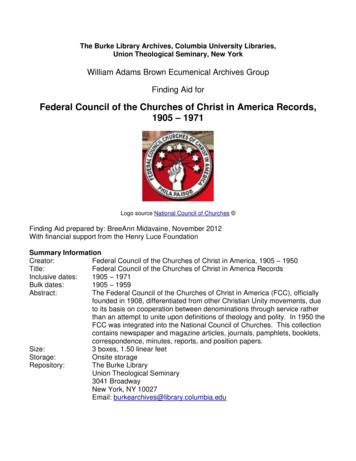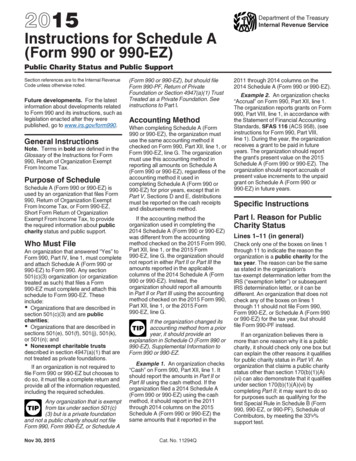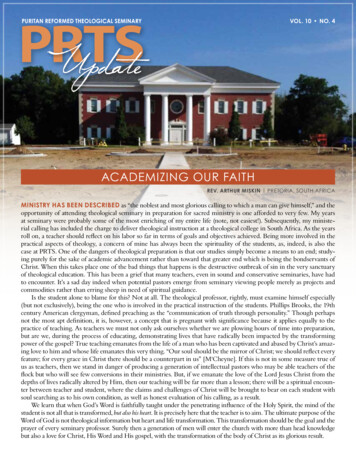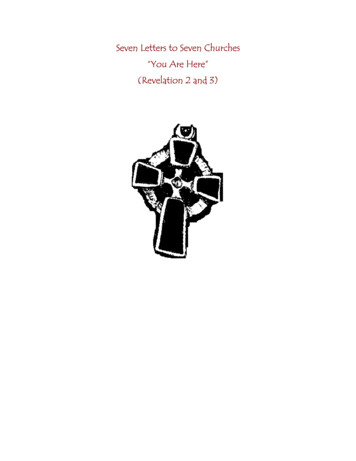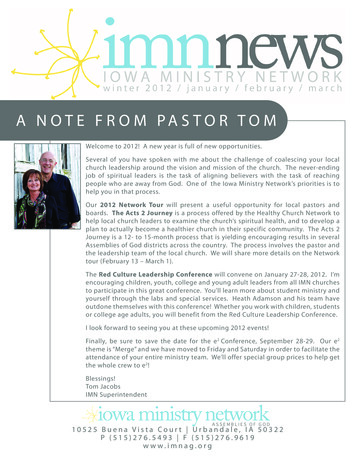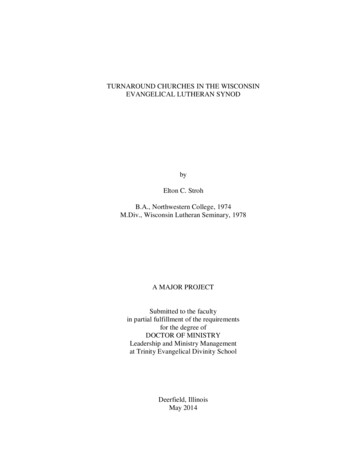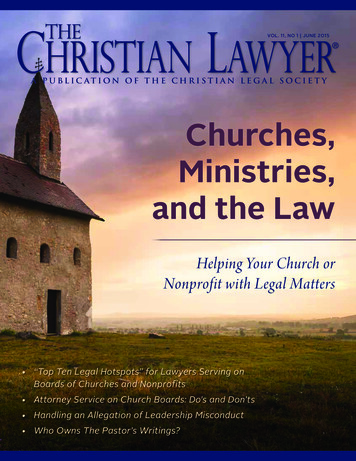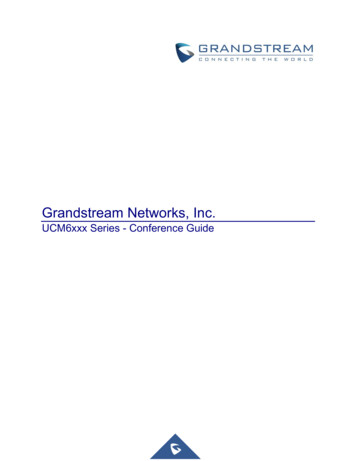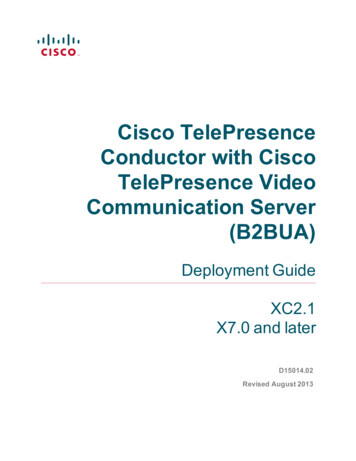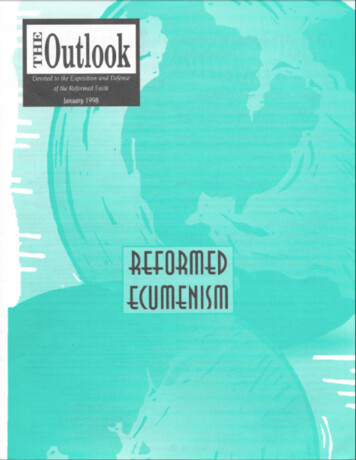
Transcription
Intemational Conference of Reformed ChurchesDarrell Todd Maurina(ICRC) Meets in South KoreaThere have been Significant shifts away from lib eralism in the Reformed family of churches thiscentury. But the approach of a new millenniumsignals a reaching out across the globe, of Re formed denominations for greater unity in edi fication and the propagation of the gospel. Therecent meeting of the International Council ofReformed Churches in South Korea is a signifi cant example of this. For this reason we are pre senting a full report of its proceedings. It is of fered with the hope that Reformed people every where will realize the importance of solidarity inthese chaotic times.The Editors, 'TIere are other church organizationsin the world, and I want to pay trib ute to those who had the foresightto begin the International Conference ofReformed Churches because it is estab lished on the Word of God rather than theword of man."That was the message delivered by Rev.John Galbraith to the delegates attend ing the opening worship service of theICRC, a conference of fourteen conserva tive Reformed denominations. Originallybegun in 1985 by the Vrijgemaakt (Liber ated Reformed) family of churches, inmore recent years the ICRC has admitteda number of denominations which wereformerly members of the Reformed Ecu menical Council. The REC has lost a num ber of conservative member churchesupset by the council's refusal to expel theGereformeerde Kerken in Nederland synodaal despite the 1979 decision of theGKN to allow the ordination of practicinghomosexuals.The REC, while not endorsing the GKN'sdecision to support the ordination of prac ticing homosexuals, has also declined toexpel one of its largest members.ICRC 1997 also marks the first time thata Korean denomination, the Kosin Pres byterian Church, has hosted a major in ternational conference of conservative Re formed churches. Meeting at the Seo Moon Presbyterian Church in Seoul, theICRC convened its quadrennial meetingwith an October 15 evening worship ser vice.Galbraith, who served twelve years asmoderator of what was then known as theReformed Ecumenical Synod, is a mem ber of the Orthodox Presbyterian Churchwhich withdrew from the REC in 1988.Other ICRC members which were formerlyin the REC include the Evangelical Pres byterian Church of Ireland, Free Churchof Scotland, Reformed PresbyterianCh urch of Ireland and PresbyterianChurch of Eastern Australia.Galbraith urged the ICRC delegates tostand in the line of the Reformation instanding for Biblical truth in the face ofboth liberalism and broad evangelicalism."We are sons of the Reformation and weare not ashamed; Luther said, 'Here Istand, I can do no other, and I hope thatfirm dedication is present in all of us to night,'" said Galbraith. 'We are Reformed;as there are neo-evangelicals there arealso neo-Reformed. We have a ministryto them, we also have a ministry to thewhole church of Jesus Christ."However, Galbraith said that holding or thodox positions is not enough; the ICRCalso needed to implement means of pro moting orthodoxy and do so by provid ing a means for denominations to seekthe advice of other denominations abouttheir problems. "In five decades of minis try I have become acquainted with manydifferent churches. I have found that incongregations and denominations and in terchurch bodies, the common problemis often that we do not have commonproblems," said Galbraith. "We are to layour needs before our brethren. God saysin Romans 12: 15, we are to weep withthose who weep, we are to rejoice withthose who rejoice, but our emphasis inwarfare has to do with those who areweeping, and in sorrow, and hurt.""We need to bring together the minds,talents, gifts and needs of the churchesto the whole body," said Galbraith. "Howare we going to respond? I do not know,but if we love one another, we will find away. Perhaps even this ICRC 1997 will finda way we can truly help one another."What will happen if the ICRC fails tohelp and admonish member churcheswhen necessary?"Other bodies have wandered away inthe last fifty years," said Galbraith. "Theytoo started out with noble purposes, butthey didn't find help, not the help thatthey needed, nor at the time they neededit," said Galbraith. "May the ICRC be theinstrument used in the hand of God tospeak the truth while there is still time."In all things, however, Galbraith urgedthe ICRC to act in a spirit of prayer andhumility.'We are gathered here in the name ofunity, but I see, and I hope you do also,The Outlook. January 1998that unity requires humility," saidGalbraith. "It means that no one of ourchurches may say of itself, 'I am the greatchurch,' we may not say We have all theanswers.'""The church of Jesus Christ does not goto war in its own wisdom and power; thechurch of Jesus Christ goes forward inprayer and on its knees," said Galbraith.Four of the seven denominations ap plying this year for ICRC membership the Associate Reformed PresbyterianChurch, Christelijke GereformeerdeKerken in Nederland, Reformed Churchesof New Zealand and Reformed Presbyte rian Church of North America - were for merly REC members. A fifth, the UnitedReformed Churches in North America, ismostly composed of members who se ceded from the Christian ReformedChurch in North America which for manyyears had been one of the REC's stron gest supporters. The other two applicantsare the Evangelical Presbyterian Churchin England and Wales and the GerejaGereja Masehi Musyafir NTT.Six other denominations and one in dependent church attended as observers.Four of the seven are current or formerREC members: the Christian ReformedChurch of Myanmar, Independent Pres byterian Church of Mexico, PresbyterianChurch of Australia, Reformed Church inJapan and Reformed Churches in SouthAfrica. The Church of Central Africa Pres byterian, Taiwan Reformed PresbyterianChurch, Korean Presbyterian Church inAmerica and Reformed PresbyterianChurches in Cardiff (United Kingdom)also sent observers.In addition to the three Vrijgemaaktmembers - the Gereformeerde Kerken inNederland (Vrijgemaakt), Canadian Re formed Churches and Free ReformedChurches in South Africa - theconference's current membership in cludes the Evangelical PresbyterianChurch of Ireland, Free Church of CentralIndia, Free Church of Scotland, FreeChurch in Southern Africa, Free ReformedChurches of North America, Gereja GerejaReformasi di Indonesia NTT, OrthodoxPresbyterian Church, Presbyterian Churchof Eastern Australia, Presbyterian Churchin Korea (Kosin), Reformed Church in theUnited States and Reformed PresbyterianChurch of Ireland.
JCRC CONVENES INSEOUL, ELECTS KOREANCHAIRMANThe International Conference of Re formed Churches elected as its chairmanDr. Soon Gil HUT, president of KosinTheological Seminary in the South Ko rean city of Pusan. Rev. Jack Peterson,chairman of the Committee onEcumenicity and Interchurch Relationsof the Orthodox Presbyterian Church,served as vice-chairman, and Rev. PieterVander Meyden, synod president of theFree Reformed Churches in NorthAmerica, served as recording secretary.Rev. M. van Beveren of the CanadianReformed Churches was re-elected .asinterim committee secretary, a post hehas occupied since the beginning of theICRC at the 1982 constituent assemblyin the Dutch city of Gronigen.BENEFITS OF ICReMost of the seven new members of the International Conference of ReformedChurches have attended prior meetings of the ICRC, and some have been involvedas observers for years. One new member denomination, however, couldn't haveattended previous ICRC meetings for the simple reason that the denominationdidn't exist when the ICRC last met in 1993 at the Dutch city of Zwolle.Rev. Joghinda Gangar of the United Reformed Churches in North America didattend that 1993 meeting as an official observer from his local congregation,Wellandport Orthodox Reformed Church in the Canadian province of Ontario. Whenthe URC held its first synod last year in the Chicago suburbs, Wellandport ORCbecame one of the charter members of the new denomination, and this year Gangarattended the ICRC as an official delegate from the United Reformed Churches.Several other URC member churches which had seceded from the Christian Re formed Church by 1993 also attended the Zwolle session, but only Gangar attendedthis year's meeting because the United Reformed synod session in Canada over lapped the ICRC session in Seoul."I think basically the purposes of the ICRC reflect our reasons for joining," saidGangar, citing inter-federational contacts and the establishment of formal ecu menical relations with other denominations as the key benefits of ICRC member ship for the United Reformed Churches.SEVEN DENOMINATIONS ADMITTED AND ARP QUESTIONEDIn its first business session, the Inter national Conference of ReformedChurches admitted seven new denomi nations, increasing its size from 14 to21 members.Most of the new denominations aregroups which previously pulled out ofthe Reformed Ecumenical Council dueto concerns over theological liberalism.However, a history of objections to theo logical trends in the REC wasn't enoughto satisfy all ICRC members that theapplicants were sufficiently Reformed tobe ICRC members. One ofthe new NorthAmerican members, the Associate Re formed Presbyterian Church, came in forsignificant criticism."What I am concerned about is thatthe ICRC continue on its course givingdue regard to our constitution," said Dr.Rowland Ward of the PresbyterianChurch of Eastern Australia. "We are nota conference of people who are reform ing, but of people who are Reformed."In response to questions from Wardand other delegates about toleration offreemasonry and a history ofBarthianism, ARPC representative Rev.Jack Whytock presented a summary ofthe recent history of his denomination."From 1978 onwards there has been achange of direction of the synod," saidWhytock, noting that the ARP decisionnot to allow the ordination of womenas ministers and elders proved to be thebeginning of a conservative shift in thedenomination that is now being re flected in the denomination's changingecumenical involvements."We have removed ourselves from theWorld Alliance of Reformed Churches,we have been an active participant in theNorth American Presbyterian and Re formed Counci!," said Whytock. "Part ofour desire is to join the ICRC to realignourselves with likeminded ReformedChurches."Rev. Jack Peterson, chairman of the Or thodox Presbyterian Church's inter church relations committee, explainedwhy his denomination - not generallyviewed as tolerant of theological devia tions - chose to establish fraternal re lations with the Associate ReformedPresbyterians, encourage their admis sion to NAPARC, and now sponsor themfor ICRC membership."Admittedly when we took this step itwas a risk," said Peterson, describing theearly history of OPC-ARP relations. "Thisis a church that was on the way out,down, in sad shape. The Lord has donea marvelous work."Assurances from the OPC weren't ad equate for all ICRC delegates. "I did notquite hear an answer on how the churchwould deal with freemasonry, if there areofficebearers involved in that," said Rev.The OutlookG January 1998c.J. Haak of the Gereformeerde Kerkenin Nederland (Vrijgemaakt). "Are thereprecedents on the matter, decisions onthis?"Whytock said the denomination hadno formal position on affiliation with theMasonic Lodge and that such matterswould be handled by the local elders,subject to church order procedures forhandling any complaints or appealsagainst decisions by local churches.The concerns of Ward, Haak, and otherdelegates led to postponement of thevote on admitting the ARP from themorning to the afternoon session. Therest of the denominations applying formembership the ChristelijkeGereformeerde Kerken in Nederland,Evangelical Presbyterian Church in En gland and Wales, Gereja Gereja MasehiMusyafir NTT in Indonesia, ReformedChurches of New Zealand, ReformedPresbyterian Church of North America,and United Reformed Churches in NorthAmerica - were admitted by unani mousvote.When the conference next took up theARP application, the advisory committeeon the matter proposed that the Associ ate Reformed Presbyterian Church be ad mitted with the proviso that its delegatebe asked "to take with him the concernsabout the issue of Freemasonry as dis cussed in this meeting."
Gangar noted that the URC member churches had maintained contacts with some of the ICRC members even before theURC was formally established and its churches were grouped more loosely under the umbrella of the Alliance of ReformedChurches. A number of ICRC member denominations, including the Canadian Reformed, Free Reformed Churches of NorthAmerica, Reformed Church in the United States and Orthodox Presbyterian Church had sent formal or informal observers tothe ARC meetings. Two of those denominations, the Free Reformed and Orthodox Presbyterians, served as the URCs officialsponsors for ICRC membership."We found two denominations that churches in the United Reformed Churches could relate to; we picked one from the US,the Orthodox Presbyterian Church, and one from Canada, the Free Reformed Churches," said Gangar.According to Gangar, the URC doesn't have any particular issues it would like to bring to the JCRe. "We'd like to participatein the growth and the purposes of the ICRC; we don't want to change it in any direction; we like the purposes," said Gangar.Instead, Gangar said the ICRCs production of study papers and potential role as a forum for assisting churches in resolvingdifficulties would be of assistance to the United Reformed Churches as a denomination. "When more specific things come upwe need to be more open and humble with acknowledging to others that we don't know all the answers," said Gangar. "Whenyou join this body there is already an understanding and acceptance of the fact that you are true churches, otherwise youwouldn't be able to join the body."The understanding that ICRC members are true churches could be particularly useful to United Reformed consistories andmembers in their local ministries, according to Gangar. "There can be more cooperation between the churches, pulpit ex changes, those kinds of things," said Gangar."I think the size of our denomination, to us it may seem pretty big, but it really isn't," said Gangar, noting that the URCcurrently has about 11,000 members and could benefit from the help of other denominations that had a longer history andlarger membership. "With the great number of liberal trends that are hitting our churches,we need to stand firm."rlThat proviso didn't please either sideof the debate. Professor Clement Gra ham of the Free Church of Scotlandmoved that the ARP be admitted with out specifying a qualification; Wardmoved instead that the conference "re joice in the positive report of the renewaland reformation in the ARPC, but deferreception of the application until it re ceives information to satisfy it that theintegrity of the Reformed system of doc trine is maintained."After further concerns were raisedabout the ARP's addition of qualifyingnotes on the Westminster Confession of Faith ,Rev. Vern Pollema of the ReformedChurch in the United States informedthe conference that the RCUS had votednot to sponsor the ARP for ICRC mem bership due to concerns similar to thosebeing expressed on the floor of the con ference.The objections raised by Pollema,Ward, Haak, and others weren't suffi cient for Rev. John Galbraith of the Or thodox Presbyterian Church. "I think theletter of the Orthodox PresbyterianChurch makes clear what is required forthe ruling office in the ARPC," saidGalbraith. "I don't think that the ICRCwould be on good ground in rejectingthis application without clear evidencethat the standards of what is requiredare not being adhered to."In light of the concerns, Rev. Paul Denconference defer action until more in ber denominations about the impor formation on the ARP is received by the tance of adhering to strict membershipconference, with the intent that Whytock standards.might be able to provide that informa Even though he had been placed ontion later in the conference session. That the "hot seat" in defense of his denomi wasn't any more acceptable to Galbraith nation, Whytock also agreed the debatethan Ward's motion.was helpful and that he would be bring "It's not going to do us a service to ing the freemasonry concern back to thehave this done because it is not a prac ARP's even apart from a formal requesttical way to find out what this. church by the ICRC to do so.believes," said Galbraith. "It's always"r think this is valid to raise; it's help nice to put off the day of decision, but I ful to our church," said Whytock."Therewould appeal to the assembly not to put are questions we will have to wrestleoff the day but to act."with as an interchurch relations commit Bya 16 to 8 vote of the delegates, the tee. It will force us to think this overICRC voted against deferring action un clearly with regard to whether there is atil later in the session:and then unani consistency with membership in themously voted not to defer action until church and of secret societies."additional information could be moreAccording to Whytock, the last signifi formally received. Finally, by a roll call cant vestige of the ARP's formervote of member denominations with involvment in mainline ecumenical af each denomination having a single vote, fairs is a fraternal relationship with thesixteen of the nineteen ICRe member mainline Presbyterian Church (USA)denominations present voted to admit that is quite informal and dates back tothe Associate Reformed Presbyterians the denomination's much earlier history.without the proviso expressing concerns"We no longer send fraternal del about freemasonry. Ward's Presbyterian egates nor are we receiving them any Church of Eastern Australia formally re more," said Whytock. "If we are no longercorded their abstention, and two other doing that, the question is, should wemember denominations abstained with do some housecleaningTout formally recording their abstentions.In anycase, Whytock said that theDespite the lack of unanimity, some del ARP's major ecumenical connection nowegates said they thought the debate was is with the North American Presbyteriangood for the ICRe. Rev. A. de Jager of and Reformed Council. of whichthe CKN-vrij. told the conference that Whytock is currently the chairman.t h e d is C U S s io nw a s h e IP f u l b e c au s e it did send a good message to the mem-c B u tt e r o f th e C h r is t e li jk e G e r ef o rme e rd eKerken in Nederland moved that theThe Outlook. January 1998
AMENDMENT OF CONSTITUTION AND REGULATIONSAfte(d t in its dctober 17 session,thelnte(:Ii/iit1cmal Conference of Re formed Churches voted l:lnanimouslytoadopt several changes to thea different version of the WCFi.andtheFree Church of Central India toasUghtlydifferentvetsion again."."Thes.edifferences have not been held 'lianliation'sC{.mstitutioh andRegula to be a bar against coopera,tion and fel tiO'ns.lowship in the ICRC, whlcn lsfieltnera'A 1cordingtc;5areporlQfanlCRCcom- church nor a synod, buta'Cdrlference'rnitt appoInted tnl993 , therevlsions of the delegates of Uk Nninded,Re er .jnteriaedas"arefonnulation ofthe formed churches," continued the report.wotdingoUh articles so astodarify' ''In reformulating the severa] artldes, wetheir real inten ion. "hamely. "ropay due have tried to do justice to the dtversity atteritionlothe unity arid.the diversity irkunity of this Biblical and Reformedof the member churches;"conference.""lORC rfiernbefchurches are (:ommit · Constitutional revisionlssues havete(i;totheBjbllcal. and Retormedfatth been the subject ot coflsiderable discus which heyconfessjntheThreef 'Grms sion in previous ICRC meetings, espe ." oftlnityand the·WeStfninsterStancrards cially the 1989 session wherethe Cana thlsis theiruntty.# wrote cornmittee dian Reformed Chtlrches and Free Re metl1'bers Rev; PeterGadsby and Dr. formed Churches ofAustraliaprGposed'Rowl;:i:IidWard,ooth gelegl;ites frbhrthe that Hdelegates subscribe only to theJilresb'9'teriariChl,lrchofEastem Allstra- stanoards of the church of which theylia:: "Butittsa unttyin diversity; for there"· ar rnembers. The' pr.o l. ·tater de aredifferencesbetweentheThreeFor:m s reated. mtermuch diSCUSSion, led to a' mf tMe ;Westminstef StanoardSl andul!tan mous teto requlrethatpropos tnere . . . '. . dr[fe ences'ln the c alsfGf altering the Constitution and.We .tJmtnsterSt nd ltdS:adhered tG by RegulationsbeUsubmjtted in accurate·se 't totolUt,Mmber.eb(lrCheS, For terms with dearlndj ;&tioooas to the··.e ple;.the. . Free·Church .0fSC6tland precise point in the'Wprding. at which:and;thelll'esb!erjMChurchofEastem thealternaUveaddtHonistG beAllstraUa sUbscpbeto'the Westminster adopted: AlessheateddebatecGntin.Conf slcn ftaltfl,·aSi'eceivedby the u d .inJ993 when thelCRC appointed htll'cHofScOtr ndlnlQ47; the anhc - Ward and Gadsbyas a committee tG Ie dbl PreSbYterian Church sUbscribes to view the membership requ.irements.Ward and Gadsby noted thatlCRCmemberchurches"whichhavereserya tions about parts of Gne Orlnore of thedocuments mentioned in the BasisI[CRC doctrinatstatementlhave;wishedto have this sectit)fi changed" to lan guage that would rtGtrequirethem tosubscribe to standardsbey'ond thosewhich they themsetves.have:adelpted. 'The major proo!emwithtnts is thatit effectivelydesl i)ys thesasis of theConference1" wrO't(!iWardandGadsby,'('ABasis must be·sharedU it is to promotesal wouMcommonality, butthimemberdivide the Basis.church adhering to only Pliif:b f . Therewould effectively betwo:ormore" R :'s each subscribing to a differertt tan'"dard.".ffSPEAKERS, BUSINESS, AND BUDGETSSPEAKERS AND TOPICS AT ICRe 1997Before adjourning, the International Conference of Re formed Churches adopted a number of concluding motionsto handle housekeeping and other matters.The next ICRC meeting will be hosted in the year 200 I bythe Orthodox Presbyterian Church at a location and dateto be selected in consultation with the Interim Committee;seek a host church for the 2005 meeting; formulate a moredetailed agenda for each day's business; ensure that all pa pers are distributed to delegates and observers and makethem available to visitors and the press; and select topicsfor papers, speakers, and the number of papers which havenot yet been determined by the ICRe. Suggested topics forspeeches included "the Work of the Holy Spirit in the Be liever," "Preaching," "Reformed Hermenetics," ·'the ChurchGrowth Movement," "Ecumenicity and Missions," "Polygamyin Relation to Baptism and the Lord's Table," "the Task ofthe Church in a Secular Society," "the Challenges of thisAge" and "the Regulative Principle."The ICRC also adopted a four-year budget for the years1998 through 2001 totaling S119,000, to be collected by as sessments based on denominational membership and per capita income.by Rev. John Galbraith and Rev. W Peter GadsbyJCRC Press Release CommitteeThe OutlookDistributed by Darrell Todd Maurina[The following edited text is excerpted from an offiCial press release producedby the International Conference of Reformed ChurcheslSEOUL, South Korea (October 23, 1997) - Five papers werepresented to the meeting and discussed. These papers will ap pear in the printed proceedings of the meeting.The first paper, "Principles of Reformed Missions," was pre sented by Elder Mark Bube, General Secretary of Foreign Mis sions of the Orthodox Presbyterian Church. Beginning with thepremise that worship lies at the heart of the church's mission ary endeavors, Bube outlined God's decree to save a people forHimself, for the manifestation of His glory. He noted that Godhas foreordained all the means by which such is to be accom plished; that it is to the church that Christ has entrusted thisministry for the gathering and perfecting of the saints; that inthis supernatural ministry, God is especially pleased to makethe preaching of the Word an effectual means of accomplishingthat end; and that, in His Word, God has fully supplied the el ders in His church with all that is necessary for them to carryout this work.0January 1998
lo snev rb eR r iardeqas;a 'shortcllt'; fijU ehUfct;th llni6n;R ther, itis ame fl pYVihicllchlltchesr;an com to,.g th tt onter on ah agreed sis, andfaeilit 'tethosediscussioos which are,, o rl'Ytne husihess of eachrespective ' ?;;. : .aresult. .the, C}mmltteeprc(}P0sed; lj 1he asisb "rao m1daied.:. so as;t tefer now to 'the R.eformedfaith'" but t iil;li hat thiS, d0es. oot require any l ntchutch to.subscribe to all ofdl 'six, documimts, or even to any ofthem! tnusleaviAiPpen 'the possibility. " admtSSion of dlnn:h woo subscribe.toc;6ther·RefomwdConfessions than;:;: oseJj ted)'·. :.·.·.' dlnn:l1es and thejtconfe sjons o kil\aveto he lA a!i!lreementwlth the. . :e 9. 1 fai'tnassumm ri in the six·. \lr:n nts, n t.he. comr:nltteest: t g. not,.)n t hat theIOR.CWa a dy. fy ctiOA"'. . ithtot. 4 Qgsitt Hhe. . : ·In.J993·th Re''. 'urchin the UrdteqStates nb"o the Heidtlberg cat-ecflis.m. . C:UShassince formally adoptedth ; Confe5: umandcanons of Don.;: It-sh gcid jdthathaving a 'cor,.Cqtlstttution will. fiot efisuretheon o-in(fa hfilln es '.ofthisorganjza-te ;t''i 9da the.cqmnlittee "TheRe . rn ni Jco'un nJSYnod)iWari.witt\a eIY Jinesounding consti tUtion j sjs;.but that.did ootprevehtthe declension in that organizationwhich has sadly occurred. The ICRC willtemaiA faithful only as itSCOAstituentmembers remain faithful, and if itceases to be faithful to the historic Re,.formed faith, then faithful memberchurches will (ri!i!lhtly) abandon it asthey have the RES/REC."While the [CRC delegates presentadopted the report uAanimously, itwasn't without cost. Prior to the meet ing, the 1996 Synod of the Free Re formed Churches of Australia withdrewfrom the ICRC and sent a letter indicat lAg that JCRC membership did not pro mote the unity aAd harmony of their de nomiAatioA. ICRC iAterim committeesecretary, Rev. M. van Beveren, a mem ber of the Canadian ReformedChurches, sllbmitted a report to thelCRC statin!i!l that "while wedeptore .the decision of the Free eformedChurches of Australia to leavethe JCRC, we welcome seVeAchurches that are applying formembership." The ICRC voted tosend the Australian letter to the[eRC interim committee with in,.structions to draft a response tothe Free Reformed Churches ofAustralia.In other relat d· mat ters, the I :R.C·an adv{sorycommitteeprQ:posai to thank theOrthodox Presbyterian Church for sub mitting a document explaining its rea sons for severing ties with the CRC inNorth America, to receive aA OPC letteron proposed policies for interchurch re lations and a document on Biblical Prin,.ciples of the Unity of the Chruch "withdeep appreciation," and that a specialpaper or papers on 'Biblical Prindplesof the Unity of the Church' be preparedfor the ICRC 2001 utilizing the materialsubmitted by the OPe. with con'tribut ing speeches from both the PresbyteriantradUioA and the (Continental) Re formed tradition, the speakers tobe de cided at a later session of this Confer ence." Another OPC letter on "Restruc turiA!i!l 'Ecclesiastical Fellowship'" wassubmitted to the advisory commit tee for a summaryreport andlater discus SiOA.UDr. Soon Gil Hur, President of Kosin Theological Seminary in Pusan, South Korea, and a member of the Kosin PresbyterianChurch, spoke on "Women in Office, with Particular Reference to 'Deaconesses.'" He stated that eldership is restricted tomale members of the church because its task is to exercise authority over the congregation. This is a clear teaching of theScriptures (l Timothy 2: 12). However, diaconal office does not involve the exercise of authority. Therefore, it seems possiblethat female members may be installed as unordained deaconesses or assistant-deacons, seeing that women were positivelyinvolved in the life of the apostolic church.Dr. Robert C. Beckett of the Evangelical Presbyterian Church of Ireland discussed "Biblical Principles for the RelationBetween Church and State." Dr. Beckett affirmed the total sovereignty of God over all the structures of authority in bothsecular and ecclesiastical realms. The New Testament does not give approval to any specific form of government. Democracyinvolves the determination of laws by the majority views of fallen man, and is a perilous substitute for the infallible Word ofGod. Both church and state are established by God under the sovereignty of Jesus Christ, and are distinct structures thatshould peaceably co,.exist and support each other. Complete separation of church and state is an unbiblical illusion, andChristians should be encouraged to act as "salt and light" within the political process. Involvement of pastors as politiciansis forbidden by Scripture, and brings dangerous confusion to the gospel message. Within a pluralistic society, the church canbest fulfill its duty to God and the state by prioritizing the Great Commission. Obedience is to be rendered to the state as faras humanly possible, without transgressing the law of God. When the demands of the state are in conflict with the law of God,God must be obeyed rather than man, and civil disobedience becomes inevitable.The fourth paper was presented by Dr. Richard B. Gaffin, professor at Westminster Theological Seminary in Philadelphiaand a member of the Orthodox Presbyterian Church, on the subject of "Challenges of the Charismatic Movement to theReformed Tradition." Gaffin addressed two issues: the meaning of Pentecost (being baptized with the Holy Spirit) and thecessation of certain gifts of the Spirit. On the first issue, Gaffin argued that Pentecost has its significance in terms of "historiasalutis" (the completed accomplishment of salvation), not "ordo salutis" (the ongoing application of salvation). It does notprovide a repeatabl
eralism in the Reformed family of churches this century. But the approach of a new millennium signals a reaching out across the globe, of Re formed denominations for greater unity in edi fication and the propagation of the gospel. The recent meeting of the International Council of Reformed Churches in South Korea is a signifi cant example of this. For this reason we are pre senting a .
